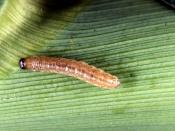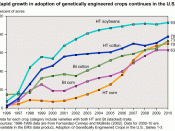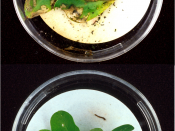In the last century scientists devised methods of modifying the genotype of food crops. This process introduces foreign genes from a donor organism into a host organism . The technique generally used is recombinant DNA1. For example, GM soya has been modified to make it tolerant to the herbicide glyphosate so that farmers can use glyphosate to control weeds without killing the crop2. Supporters of GM foods believe key food crops will be genetically engineered to offer improved nutrition, repel pests, and prosper in hostile environments - a world in which food is plentiful and hunger scarce. There are others, however, who do not share this optimism. They argue we do not know enough about the science and that altering genes could lead to unforeseen problems for future generations. Their concern is that genetically engineered crops pose substantial risks to human health, the environment, and rural economies.
Indeed, there are numerous hazards GM crops pose to the environment, many of which have potential to cause grave damage.
One of the biggest fears is the possibility that foreign genes introduced in GM crops could 'escape' and through cross-pollination or seed dispersal mix with non-GM crops3. For example, the herbicide tolerance trait could be transferred to weeds producing 'superweeds', which cannot be controlled by herbicides. Insect resistant genes from GM crops may also escape and be transferred to wild relatives, changing the biology of these plants. The traits may give them an advantage over other plants because their ability to resist insect attack may enhance their chances of survival. A solution to this problem would be to have 'buffer zones', reducing cross-pollination between GM crops and non-GM crops. This is done in conventional farming to separate oilseed rape used for food and that used to produce industrial oils...


